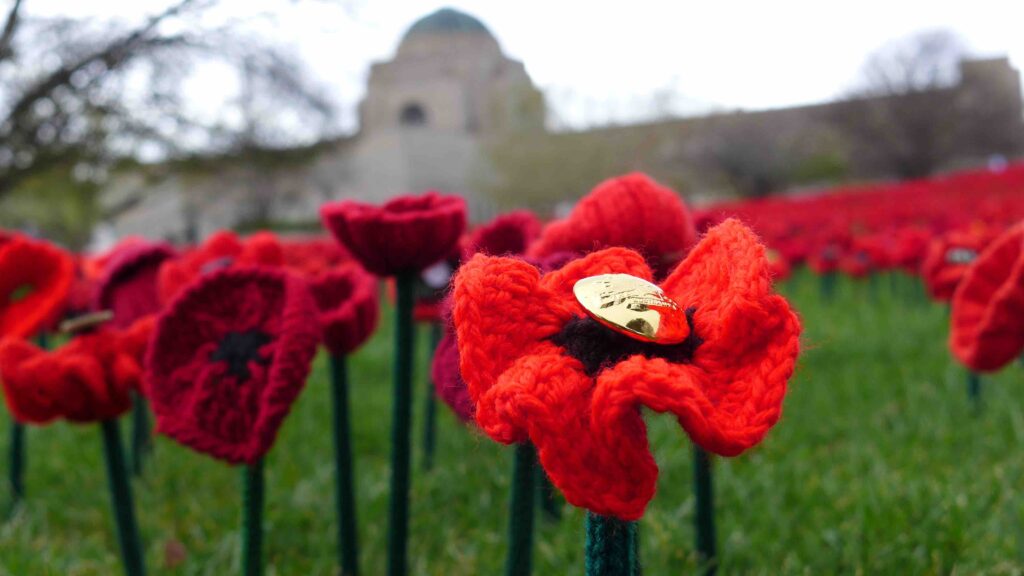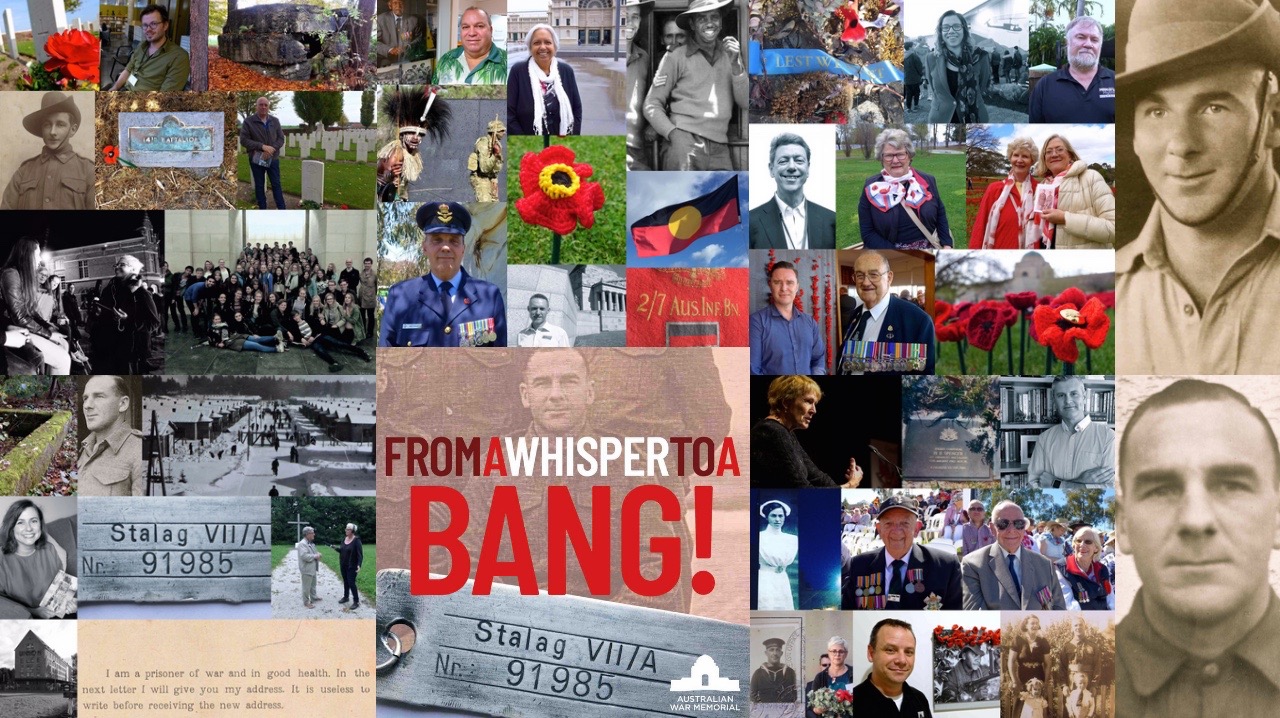
You might have noticed, it’s been a bit quiet around here lately. Well, for the last 6 months or so anyway.
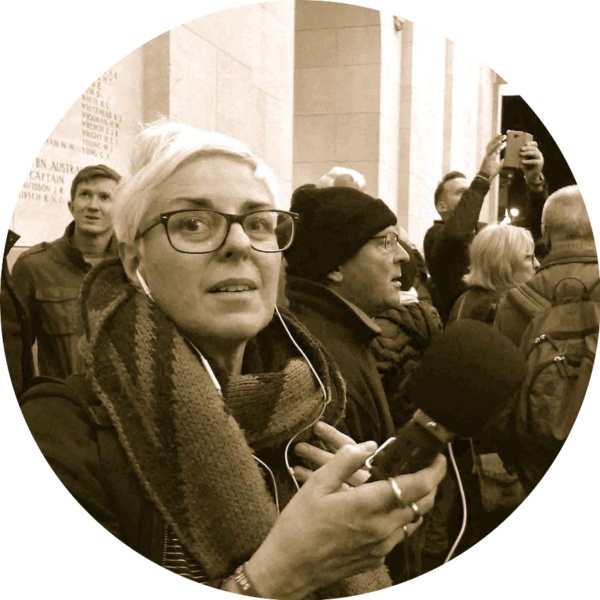
Recording at Menin Gate. Photo: Oliver Budack
Something really BIG has taken up my time. For the best part of two years really… The biggest creative project of my life.
I’ve been working with sound since the late 1980s, and working in radio most of my life – from the early days at 3RRR, to triple j, then on ABC Local Radio and Radio National too.
Radio’s always been my “first love”. When I relocate to Berlin in 2015 as a freelance media maker (and as a newly-minted meditation teacher!) I add “podcast maker” to my suite of skills. It seems a “no brainer”. Helping set up a studio inside a friend’s fourth-floor altbau, I spend the best part of a year producing / co-presenting Three Wicked Women, in an of itself a massive project.
 I also start Auspicious Plastic, my first foray into personal storytelling. And then Gut Feeling, a fun, pilot podcast series about food and wine with my “somm” husband Oliver.
I also start Auspicious Plastic, my first foray into personal storytelling. And then Gut Feeling, a fun, pilot podcast series about food and wine with my “somm” husband Oliver.
Two years later in April 2017, on an annual visit home to Australia to see my then 82-year-old Dad, quite unexpectedly my next big audio storytelling project presents itself.
I spend a Sunday afternoon in an outer suburb of Melbourne at a rare family reunion, ten of us around a kitchen table, at my Aunty Delma’s. We’re all descendants of soldiers, from five brothers – four great-uncles and my grandfather, Harry, my Dad’s dad – served in the Australian Military Forces across two world wars, with one, “Hughie” serving in both.
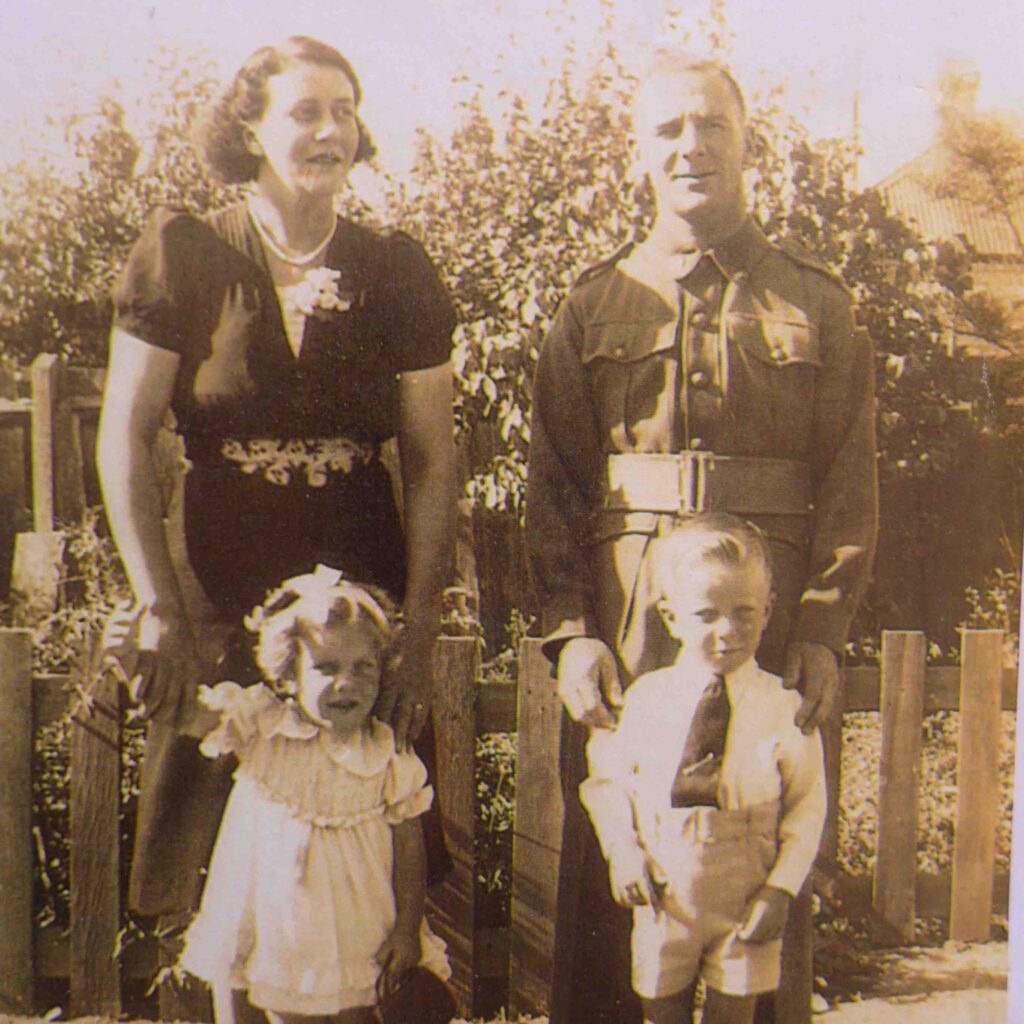
My grandmother Lillian with my soldier-grandfather Harry, in 1940, with their two little children, Margie, 3, and Bobby, 5 (my dad). Harry ships out to the Middle East not long after this photo is taken.
Harry’s born in 1910 and dies in 1987. It’s thirty years since he passed. Shamefully I haven’t thought about him much in that time. All that’s about to change though. Around that wooden table, Harry’s war story comes into sharp focus. So do those of his brothers – especially great-uncle Richard, Harry’s older brother, who dies on the Western Front in Belgium during WW1, just shy of his 19th birthday.
My kin become consumed with the wartime experiences of our ancestors. I realise just how present the war still is for them! And the scars it leaves behind… For my Dad too. It’s an emotional day. And inspiring.
Stunned, I need to find out more. To investigate. Back in Germany where I’ll be living for another 9 months, I embark upon a journey of ‘historical empathy’ to follow in Harry’s soldier-footsteps. An Anzac captured on Crete in 1941, he spends the next four years of his life in as many prisoner-of-war camps in Germany and occupied-Poland.
I go deep into the heart of Harry’s POW experience, visiting the sites of his suffering. What I discover beggars belief. It’s a pilgrimage that keeps getting bigger.
So, I decide to make a podcast about it – to ask some ‘big’ questions around remembrance and our practice of “lest we forget”. In our “post-truth”, “post-history”, “best we forget” world of right now, are we forgetting? And what happens if we do? I start here, to see where it will lead me, not quite realising what I’m about to get myself into…
—
It’s been a long time coming, but for the first time in my life I finally buy myself a professional sound recorder – it’s a Zoom H5 with interchangeable SGH-6 shotgun mic and sexy HD-25 Sennheiser swivel headphones. Perfect for the field.
I start interviewing. And keep going.
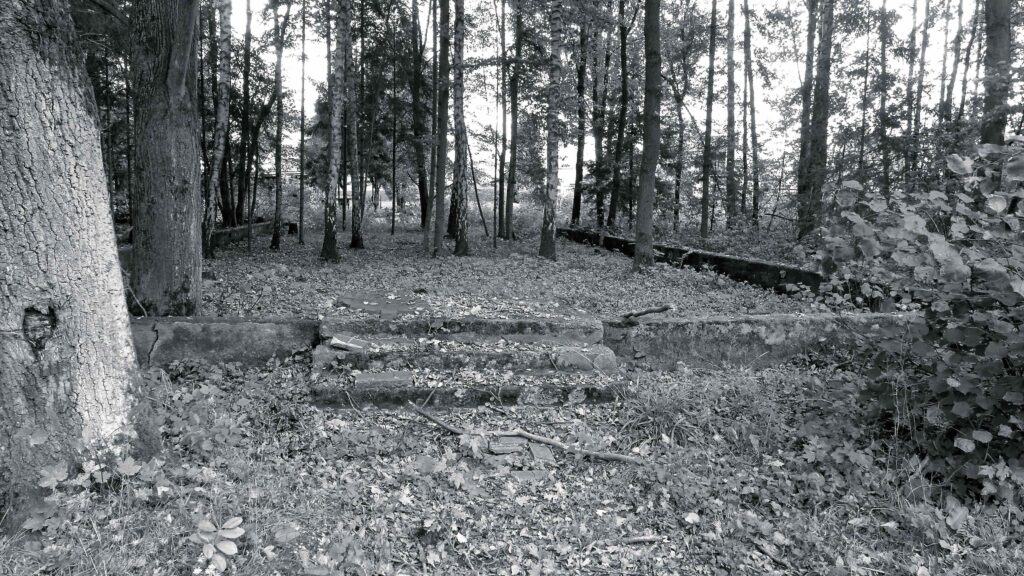
The ruins of Stalag XI-B/357 in Fallingbostel, Germany, one of the four POW camps in which Harry was prisoner, in during WW2. Photo: Megan Spencer (c) 2017
After returning to Australia to live again at the end of 2017, with hours of interviews and sound recorded in Europe (from Germany, Belgium, England and France), I start to look for a ‘home’ for this project.
It’s ambitious: a six-part, long-form, narrative documentary podcast series exploring remembrance through the lense of personal storytelling, two world wars, three generations, four POW-camps and (what amounts to) 60+ voices from Europe and Australia. There’s never been one like it – not made here, anyway.
How do we make sense of war and what it leaves behind?
I need to find the the ‘right’ home for it – one where remembrance is understood, contemplated, interrogated and appreciated. Especially in a nation so very shaped by war, as ours is, and was, from the Frontier Wars onward to now.
But the ‘usual’ doors are shut. It seems we’ve hit ‘peak podcast’. The game’s changed too. When you’ve been out of the country – out of the media – for a bit, and prefer self-reflection over self-promotion, it can be a ‘challenge’ to get people to return your emails and calls. Even with a lifetime’s worth of skin in the game, mates in the media… Time to think outside the box.
There’s one place I secretly hope might be interested in supporting the series – help see it through to completion, give it a roof over its head… One that could be the right fit: the Australian War Memorial. Especially as now 2018 is upon us – the Centenary of the Armistice of The Great War. An auspicious year – and in my lifetime! The timing might be right, you never know..
It takes a few months. But eventually – and excitedly – the Memorial commission the series, help resource it, and agree to host the podcast ‘free’ on their website. Their first. Amazing.
Then things get really busy: more travel and interviews, intensive research, fact-checking, trawling through sound archives, negotiating and – reaching out to people who ‘know’: historians, authors, curators, archivists, distant family, close family, and custodians and curators of Indigenous remembrance and service.
And – to a small group of creative collaborators and supporters, friends and acquaintances, some from past days, talented artists all. People want to see this podcast get made. They help get it over the line. It’s poetic.
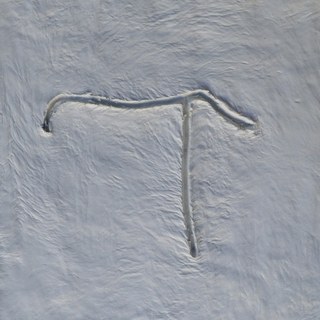 I ask Cretan-Australian music duo Xylouris White if they will make their cinematic album Goats available for the series music. They say yes.
I ask Cretan-Australian music duo Xylouris White if they will make their cinematic album Goats available for the series music. They say yes.
The island of Crete loomed so large in Harry’s life: it was where he was taken prisoner-of-war after an epic battle between Allied Forces and the German Army and paratroopers, firstly across mainland Greece, then on that strategic, beautiful island – the island Churchill refused to let fall, the island Hitler was determined to take.
I glean the title for the podcast from a descriptor George Xylouris gives about his father’s virtuosity as a performer, in the documentary A Family Affair. “From a whisper to a bang!” he says about Psarantonis’ lyra playing and singing, which explodes out of the quiet.
Serendipity. Sounds like Harry’s war story.
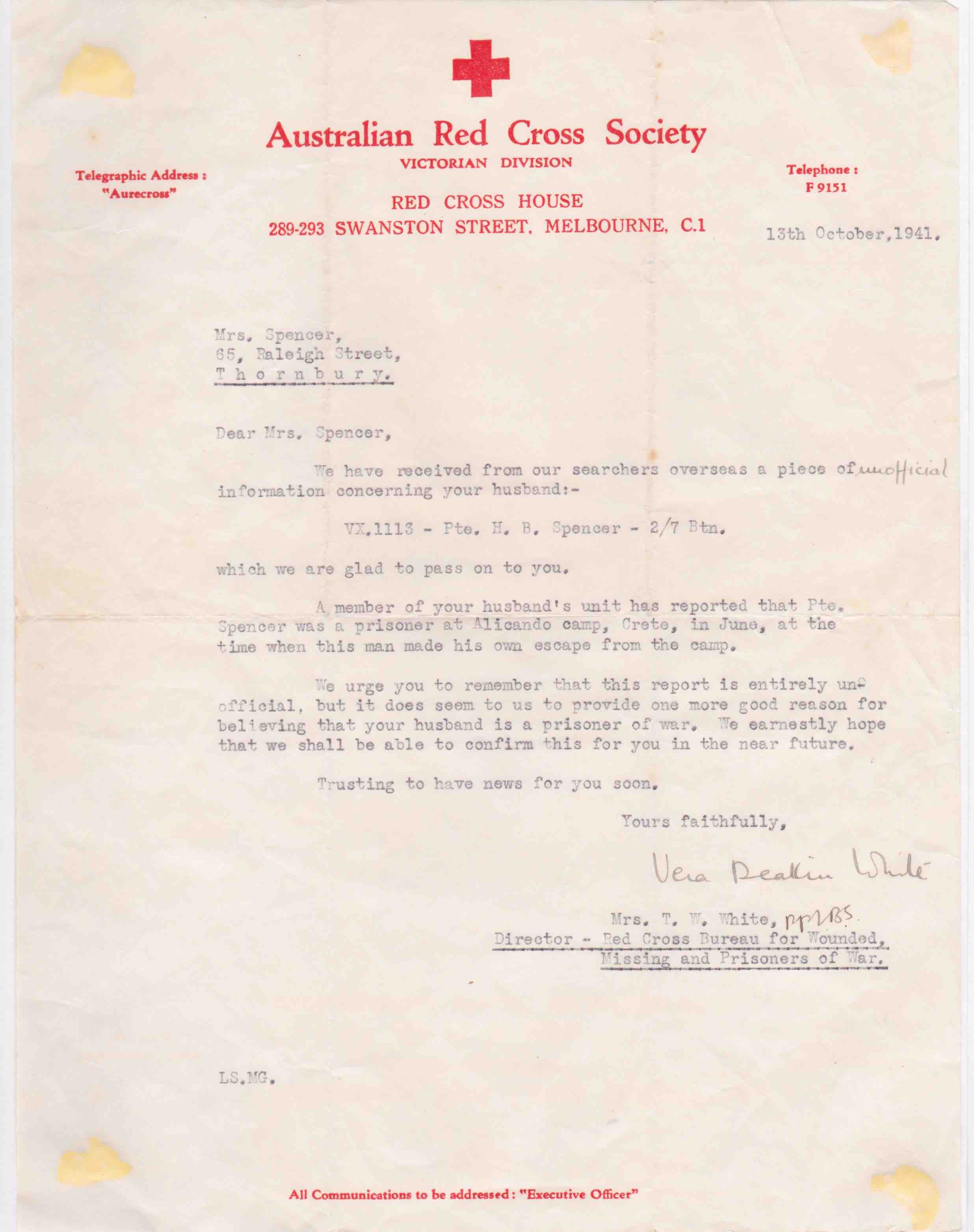
Can you imagine… The Red Cross letter to Lillian, about Harry’s possible POW status, listed as missing in Crete, in 1941. It was written by Vera Deakin White, Australian founder of the Red Cross Bureau for Wounded, Missing & Prisoners of War.
In Berlin I’ve already taught myself how to use Garageband on my old workhorse of a MacBook Pro. Back in Australia I soundproof a room in my new place, buy a ripper of a vocal mic, a pop-filter and off I go. Six one-hour episodes will be produced monthly in my home studio between January – June, 2019. It’s a steep mountain to climb, but I do it, one step at a time…
Two years after that kitchen table ‘light bulb’ moment, the result is From A Whisper To A Bang!, “an unforgettable podcast about wartime remembrance”. Episode 01 comes out January 31, 2019, the sixth and final installment on June 26, 2019.
It takes every fibre of my being: as a storyteller and script-writer, as sound designer and radio maker, as a researcher, producer, performer, interviewer, documentary maker… And as a human being.
Empathy – taking the perspective of another and the ‘other’ – is the lifeblood of this series.
I need to become a bit of an historian too. I read a LOT of history books over these two years. Academic papers. Magazines. Articles. Stories about war. And spend a fair bit of time online – and on the phone – with historians, who I sometimes ring out of the blue…
All this with my grandfather’s handwritten memoir firmly wedged in my back pocket, most of which takes place during the Second World War. From early of training at Puckapunyal in regional Victoria to final liberation, on the road, on foot, near the River Elbe, as a near-starving POW on the way to doomed Berlin.
Between 1941 – 1945, in captivity, never knowing if he is to make it home, let alone out of this war alive. Then just as suddenly – repatriation to England. Home to Australia. To chronic post-conflict, post-POW anxiety. And the difficult aftermath. Such a story.
It’s a steep learning curve and feels as if I’ve been working towards this project my entire life – with a fair bit of of grief thrown into the mix: for my grandfather, for his family, my family… And for all those who lived through this time. And what came after. It’s a lot to take on – and in.
It takes everything I have to make this podcast. (I have no idea at the time).
Suffice to say, 90 interviews on, a year in production and six one-hour episodes later, now that the series is complete, I’m in recovery. It’s a slow process. Walking through two world wars in as much close up detail as I did, can be traumatic. Talking about war – and listening to people talk it – is healing.
It’s important we get to speak about the effects of war. So many have not had the opportunity – or given themselves permission to. Simply put, war has touched us all. And as I discover, people are hungry to speak – to find out what happened, to ask “why?” To reflect on the heavy price of conflict.
And to listen to the stories of others and reflect on their own family’s war story and history.
The podcast strikes a chord with audiences: 5,000+ listens so far, and still growing.
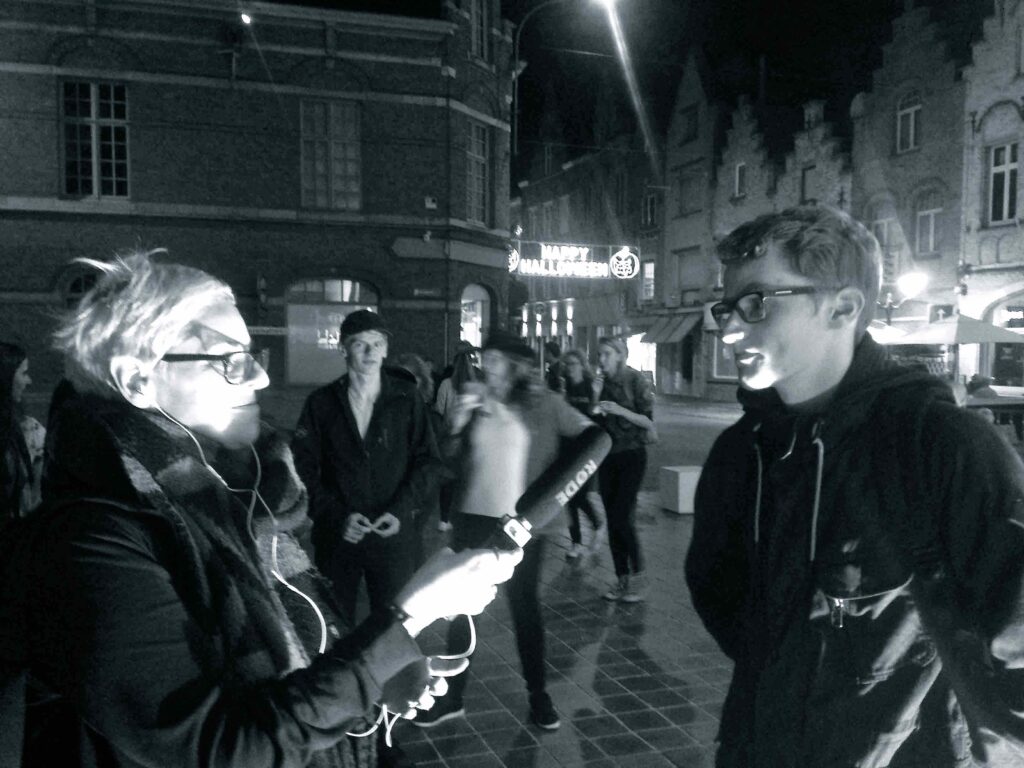
Me interviewing students from Atlas College, The Netherlands, at The Menin Gate in Ypres, Belgium. Photo: courtesy of Ton de Jong
Difficult as the experience was at times, I wouldn’t change it for quids. It was a privilege to make and I’m grateful to so many. And, in awe of my POW grandfather for his resilience amid such suffering.
His story has lead me to such amazing stories about the human capacity for endurance, resilience and survival – physical and emotional – and taught me much about the human spirit.
And, that we must never forget the very human costs of war, no matter what.
* * *
Today is September 3, 2019, exactly 80 years since Australia entered the Second World War. The day that changed everything.
May we remember well, always.
* * *
- Words: Megan Spencer
- Binge: all six episodes of From A Whisper To a Bang! here, here, and wherever you find good podcasts.
- Watch: the FAWTAB trailer on Youtube
- Listen: to Xylouris White’s music (new album The Sisypheans out Nov. 8)
- Read: this essay about the making of the podcast.
- Listen: to The Diggers Requiem (Amiens, FRA) on Soundcloud. (This epic, beautiful music commission from the AWM was also used in some episodes of FAWTAB. The project devised and managed by composer Christopher Latham).
- Visit: the Australian War Memorial website.
- Join: the ‘From A Whisper To a Bang!’ community on Facebook.
- Thank you: to everyone involved with the production, its supporters and to those who shared their quotes and recommendations!
* * *
WHAT LISTENERS ARE SAYING…
“Fantastic stuff! Expansive, emotional, informative, self-reflexive and engagingly critical.” – Philip Brophy
“A moving, superbly scripted and produced, and very personal podcast. I whole-heartedly recommend it, but keep a hanky handy!” – Sandra Sarala
“The amount of love and passion used in putting this together is off the scale. It is a remarkable, moving, personal story and yet a story we should all be aware of. Remembering is imperative if we are to not to let the horrors of the past happen again. An essential listen!” – Rob Wimpory
“I love your storytelling” – Matt
“Listen.” – Jeremy
“This podcast is like no other. It is unexpected, poignant, intelligent, and thought provoking. If you would normally shy away from war related media, ‘From A Whisper To A Bang!’ will surprise you.” – Ben MacEllen
“It had me fascinated from start to finish. Can’t recommend enough.” – Naomi
“This thoughtful podcast gets beneath your skin and at some point in every episode I found myself moved to tears.” – Adele
“Even we, two and three generations removed, carry some kind of pain or scar from what our relatives went through. ‘From A Whisper To A Bang!’.. gives some sense of how valuable it can be for a person to be able to visit the places their relatives walked.” – Alex Norman
“A truly moving, interesting, informative, personal story about the POW experience”. – Anna
“My Dad just spent the last hour with headphones on listening to Episode 01 in my backyard. [He] had tears in his eyes… [and] is moved by your awesome work Megan Spencer.” – Nicky
“I have loved this podcast! I love the perspective it brings. It’s all well and good to have the grand histories (and they’re a must if you’re to grasp context etc.), but this makes history almost tangible. Podcasts and history done like this is really the ‘future’ of history – showing it to be an ever-present thing. Thanks AWM!” – a listener comment on Instagram
“Megan Spencer has covered so much ground and so many interesting topics in this series. From the deeply personal to untold or forgotten stories around Australia’s history of war and those who fought it. The knowledge passed about the Indigenous contributions makes it worthwhile alone, not to mention visiting sites in Europe and Australia, while telling her story. Astonishing – 5 stars.” – David, a listener on Apple Podcasts
“Very moving… Fantastic work!” – Siobhan
“I’ll be honest… Choking back tears a little listening to Megan Spencer’s amazing ‘From A Whisper To A Bang!’ podcast. Just amazing.” – Kristoffer Paulsen
“Great stuff! It’s a great combination of historical context and personal story. I found it very moving, and I also learned a lot. From beginning to end it’s a great series.” – Peter Monteath
“I’ve just listened to the first episode and it truly is wonderful. Your accent and tone are so warm, which can make or break a podcast. The letter from your gran… was very moving, and had me teary.”- Garry Crook
“Excellent”. – Robyn

